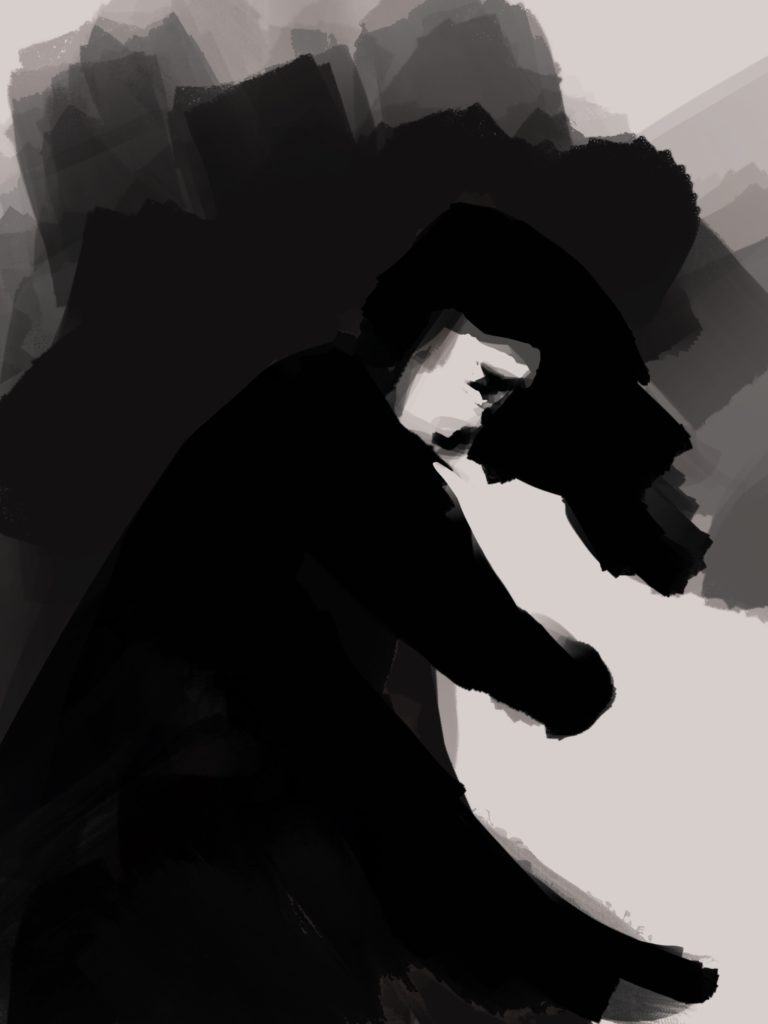There’s never enough time says Philip Bourke Marston in this powerful poem about loss and bereavement.

“His life has been for a long time one of extreme sadness, and his death can hardly be regarded as other than a welcome relief from hopeless and peculiarly distressing suffering.”
Algernon Charles Swinburne, poet and friend
If you were to read Philip Marston’s early poems, you would be forgiven for thinking they were written by an entirely different author. He had a particular fondness for the sonnet form and one of his most famous poems, The Rose and the Wind, idyllically celebrates flowers and nature. However, over the course of his own life, his poetry would change drastically in tone and his later poems are dominated by melancholy themes: ruminations on death, the brevity of life and the merciless passing of time.
I
A little time for laughter,
A little time to sing,
A little time to kiss and cling,
And no more kissing after.
II
A little while for scheming
Love’s unperfected schemes;
A little time for golden dreams,
Then no more any dreaming.
III
A little while ‘twas given
To me to have thy love;
Now, like a ghost, alone I move
About a ruined heaven.
IV
A little time for speaking,
Things sweet to say and hear;
A time to seek, and find thee near,
Then no more any seeking.
V
A little time for saying
Words the heart breaks to say;
A short, sharp time to pray
Then no more need for praying;
VI
But long, long years to weep in,
And comprehend the whole
Great grief that desolates the soul,
And eternity to sleep in.
Marston’s life was marked by misfortune, beginning when, only three years old, he was exposed to scarlet fever. As a preventative treatment he was given belladonna, a risky plant remedy – so risky in fact that it has been known, amongst other names, as murderer’s berry! Marston survived his treatment but suffered severe side effects and became partially blind. Over the years his eyesight would gradually deteriorate and he would eventually lose his vision completely. Perhaps as a result of his diminished sense of sight, though, he developed an affinity for music and his early melodic poems were popular hits. His father, John, inducted Marston into Victorian literary society (nineteenth-century Lincolnshire was a surprising hotbed of literary activity; luminaries included no less than one Charles Dickens) and people were very taken by such technically accomplished poems being written by such a young man. He met and fell in love with Mary Nesbit and they were quickly engaged to be married. So, with the close support of his father, literary friends (including Dante Rossetti) and fiancé, his life looked set for happiness and success.
Fate had other plans in store.
Beginning in 1871 with the death of Mary from consumption, a wasting disease that struck fast and deadly, Marston would fall foul of a series of calamities that undoubtedly darkened his outlook on life. In 1874 his friend Oliver Brown also died suddenly from disease, and in 1878 tragedy would strike triply hard: his sisters Cicely and Eleanor, as well as Eleanor’s husband, were all taken by sickness over the course of a few short months. In 1882 both his mentor, Rossetti, and a close friend, James Thomson, died of Bright’s Disease – the latter in Marston’s own rooms. Perhaps the final straw was the death of his father, who had remained his closest friend, in 1883. Don’t forget that his sight was also rapidly deteriorating in step with this sequence of tragic events. At the tender age of only thirty-seven years old, Marston himself suffered so much from ill health that he couldn’t recover and died in February 1887.

No wonder After is such a sad poem. It tells us in no uncertain terms that time is short. One moment we have time – the next it’s gone. Marston writes the poem from the perspective of After, showing us the happiness he – briefly – had: love and golden dreams. But no sooner do we glimpse these things than they disappear from the poem. The poem is intensely personal, there is no doubt that we hear Marston’s personal voice and, from the third verse onwards, the words thee and thy (meaning ‘you’ and ‘your’) address the poem to a specific listener; Mary Nesbit, recently passed away, must be our prime candidate. References to kisses, love and unperfected schemes strongly suggest memories of Mary and their foreshortened engagement were uppermost in Marston’s mind when writing these lines.
Marston’s chief lament is expressed in the first three words of the first three lines: a little time. Repeating words at the beginning of lines of poetry is called anaphora; Marston employs this technique to hammer home the lesson of his life’s experience – that time is so mercilessly short. A little time… a little time… a little time; the sounds of the words (that repeated T) and iambic rhythm (de-dum, de-dum…) seem to mark time passing like the tick-tock of some remorseless clock.

Whether sonic or structural, these kinds of repetitions are probably the poem’s defining feature. Later we’ll see reiteration, a form of repetition by which the same idea is repeated using a variation of wording; five out of six verses begin with the same idea, expressed as either a little time or reiterated as a little while. Inside each stanza, Marston repeats certain words: kiss/kissing in the first, scheme/scheming and dreams/dreaming in the second, seek/seeking in the fourth and pray/praying in the fifth. The whole poem is built around this pattern of ‘giving-and-taking’ by which he feels the hope of happiness but has no time to see his dreams fulfilled. His poem recreates the ‘cutting short’ of his experiences: love (kisses), prayers, dreams and plans (schemes) are all left unperfected, unfinished, cut short by the brevity of time.
Other aspects of form are used to support the impression that time flies swiftly by. Given that the lines themselves are so brief – the first two and fourth lines of each stanza have only three stressed beats while the third line is a beat longer, seeming to ‘run away’ with itself – the poem seems to slip past in barely any time at all. Marston employs a clever rhythmic pattern by which the first-and fourth lines end on an unstressed syllable (while the middle two lines, as well as being slightly offset, end on a stressed beat). Here is the first stanza presented with accents marked:
A lītt/ le tīme/ for lāugh/ (ter,)
A lītt/ le tīme/ to sīng,/
A lītt/ le tīme/ to kīss/ and clīng,/
And nō/ more kīss/ ing āf/ (ter.)
You can see that the first and fourth lines are extended by one syllable. This is a technique called catalexis, which ensures these lines end on an unstressed beat. Technically called falling rhythm, you can also say the first and last lines have weak endings (in the past they were called ‘feminine endings’, but this terminology is no longer in use). The effect of falling rhythm is to create a slight ‘unfinished’ feel to the lines, as if the speaker lingers for a moment, unwilling to move on, or tries to grasp at things that have already disappeared. In the first stanza, rhythm combines very well with the connotations of the word cling: holding on tight and not wanting to let go.

Even if you didn’t know about the death of Mary Nesbit, let alone all of Marston’s other friends and family who passed away over the years, the diction of the first two stanzas implies the reason for Marston’s melancholy. Words like laughter, kiss,love and especially cling, with those emotional connotations, recreate the painful nostalgia of a happy past – a past that is negated by the use of the phrase no more between each pair of repeated words. That’s why, when the poem pivots around the little word now in the third stanza, the word alone hits like a shot:
A little while ‘twas given
To me to have thy love;
Now, like a ghost, alone I move
About a ruined heaven.
The words given and have collide with their unwritten opposite – ‘taken.’ Actually, the words not spoken in the poem resonate powerfully. At one point he says and no more kisses after… after what? We don’t hear about Mary’s death, or any of the others, but we feel the pain of Marston’s loss; all his plans and schemes, his golden dreams, cut short by fate and time. Marston’s a ghost, the simile telling us that a life lived alone, in the dark, is a kind of living death. Suddenly the word After suggests ‘afterlife,’ an idea compounded by the phrase ruined heaven. Do you feel it is worse to have loved and lost than never to have loved at all? Do you think that, if he was born blind, he would be able to accept this condition more than having to learn to cope with it as he grew older? Marston suggests that, having tasted heaven, to have it ruined is all the more painful.

One thing I very much like about this poem is that, apart from golden dreams that we noticed before, it doesn’t at all rely on the visual field of perception to recreate Marston’s memories. As already noted, Marston’s sight was slowly deteriorating over the course of his life, so those golden dreams are not just metaphorical: when he was younger Marston was able to discern colours, vague shapes and movements. The loss of golden dreams to the passing of time evokes the fading of his limited vision into complete blindness. In this context the word dreams can refer both to the future (the unfulfilled plans he was making with Mary) and the past (his faded memories of colours and images). No wonder the things he regrets and misses the most are auditory: laughter and songs from the opening verse and speaking, say, hear, and saying, all from the fourth and fifth stanzas, suggest that sweet memories are as much audible as visible. (The word cling from the first stanza is also a powerful tactile word, again operating in a perceptual field other than the visual). Assonance is used to strengthen the auditory effects of the poetry in these stanzas, particularly the plaintive long EE sound in the words speaking, sweet, hear, seek, thee, near and seeking from stanza four and the melancholy A sound in stanza five: saying, heart, breaks, say, sharp, pray and praying. Assonance sharpens the note of self-reproach in Marston’s tone of voice as we move into this part of the poem, and I can feel his words spiralling more and more tightly into himself, his own personal losses. After all, the brevity of time is part of the human condition: we are all of us allotted such a short span in which to live our lives. But when Marston starts lamenting the things he said (or didn’t say: words the heart breaks to say suggests he never got a chance to say goodbye, so short and sharp was the illness that took Mary away) I get the feeling that I’m glimpsing a pain that is more intimate and personal.
That pain breaks out in the moving final stanza. Following the poetic tradition of the turn or volta, by which a poem would change in some way (normally a change of perspective, tone, or subject matter) Marston turns between the fifth and sixth stanzas. Often the turn is marked by a connective such as ‘yet,’ ‘alas,’ ‘thus’ and so on. But helps us recognise the turn in this poem. Marston spins the phrase a little time back upon itself and gives us long, long years instead. Here is the true tragedy of the human condition: it’s not that time passes quickly, it’s that it passes inconsistently. Times of happiness and joy are over before they have truly begun; times of sadness and great grief that desolates the soul last forever. Even in these final lines, Marston continues to employ his patterns of repetition: great grief gives us two harsh gutturals that seem to catch like painful words in his throat; the way soul echoes in the word desolation squeezes every last drop of pathos from the line.

Marston’s craft conveys the feelings that any reserves of strength he had left have collapsed. Diction suddenly jumps up an emotional level after the turn, stanza five’s controlled saying and praying contrasts with weep, grief and desolation. If you’ve been paying careful attention to punctuation, you’ll have noticed that up till now all the stanzas have been end-stopped (the final line is marked by a full stop). By contrast, the last stanza is not separated out from the rest; enjambment connects it to the stanza before, and the same technique runs line two into line three in a way that suggests an outpouring of overwhelming emotion. Suddenly a poem that had been quite restrained resorts to hyperbole (a deliberate use of exaggeration) in the phrases long, long time, great grief, desolates the soul and eternity to sleep in. Hyperbole easily suggests a loss of emotional control; giving us four hyperbolic phrases in a row intensifies that impression.
The final line of the poem, an eternity to sleep in, suggests that death will finally provide a relief from his suffering. Given this, you might like to go back to the title and reconsider the connotations ofAfter. Throughout the poem, after has been synonymous with now, the unhappy present once love has gone. But don’t forget the image of Marston as a lonely ghost drifting through a ruined heaven – why would he want to enter a heaven that’s been ruined? After the long, long years of loneliness and grief, it might be preferable to want an eternity of sleep rather than continue his suffering in the afterlife. Another possibility to consider is the link between sleep and dreaming; by entering an eternal sleep he may be able to revisit his happier past in his dreams. An illusory glimpse of a fulfilled life with Mary might be more appealing to Marston than spending the afterlife all alone. In the last line, he rejects the promise of heaven in favour of oblivion.
After all that Marston has been through, who could blame him?

Suggested poems for comparison
- Roses and the Nightingale by Philip Bourke Marston
If you fancy something less bleak by the same author, this poem demonstrates the lighter side of Marston’s imagination, before time and tragedy wore away at his spirit.
- Grief is a Mouse by Emily Dickinson
In Marston’s poem, grief is writ large in almost every line. Dickinson explores the same theme, but begins her poem with the idea that grief is a tiny, insistent presence, like a mouse hidden away in the rafters of an old house. Her poem goes on to develop more imaginative ways to consider the sadness of grief and loss.
Additional Resources
If you are teaching or studying After at school or college, or if you simply enjoyed this analysis of the poem and would like to discover more, you might like to purchase our bespoke study bundle for this poem. It costs only £2 and includes:

- Study Questions with guidance on how to answer in full paragraphs.
- A sample Point, Evidence, Explanation paragraph for essay writing.
- An interactive and editable powerpoint, giving line-by-line analysis of all the poetic and technical features of the poem.
- An in-depth worksheet with a focus on examining repetition and expectation
- A fun crossword quiz, perfect for revision or a recap lesson.
- A four-page activity booklet that can be printed and folded into a handout – ideal for self study or revision.
- 4 practice Essay Questions – and one complete model Essay Plan.
And… discuss!
What did you think of this analysis of Philip Marston’s poem? Were you aware that Marston suffered from blindness? How does this knowledge affect your reading of the poem? Why not share your ideas, ask a question, or leave a comment for others to read below. And, for daily nuggets of analysis and all-new illustrations don’t forget to find and follow Poetry Prof on Instagram.